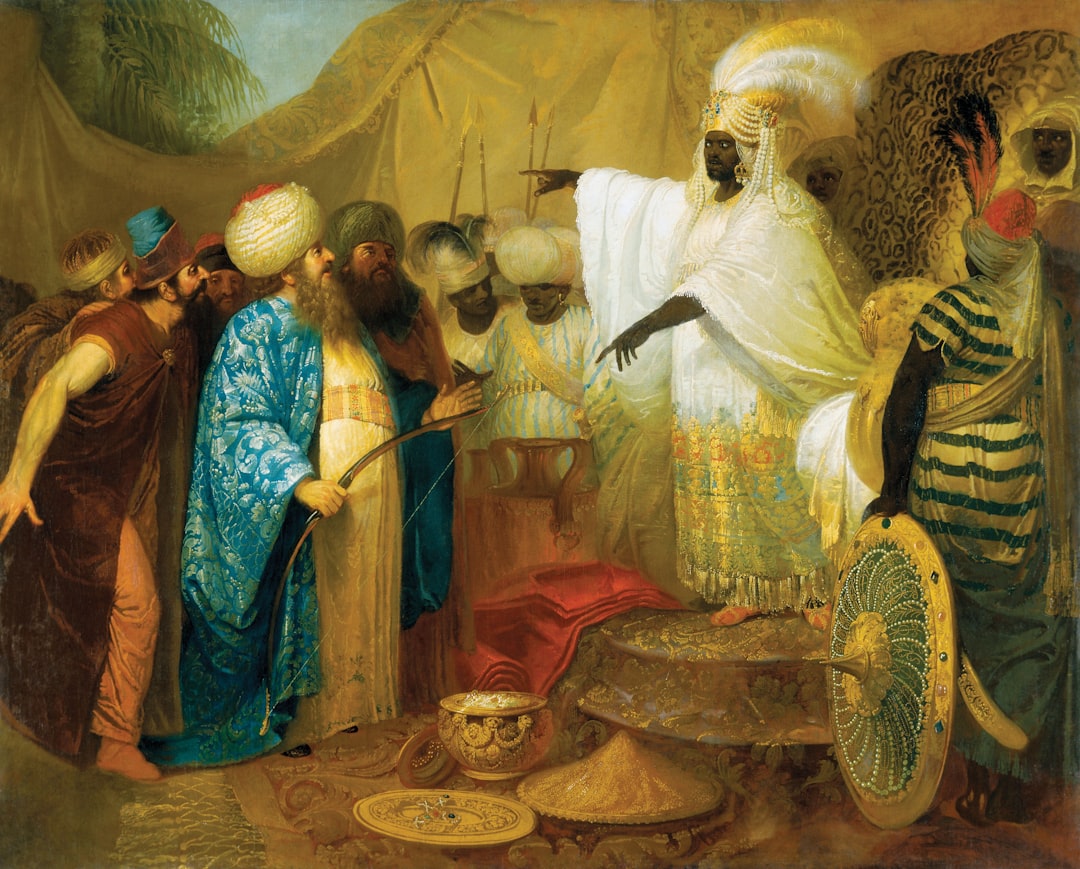One of the famous characters in the Old Testament, King Ahab, has always piqued the curiosity of readers. His reign was marked by his marriage to Jezebel, engagement with prophets, and a significant conflict. A deep dive into his life and legacy can offer a rich insight into Israelite society and culture. In this blog post, we’ll delve into his journey from early years to reign, and unravel his personality through his story. Keep reading to uncover the secrets of King Ahab in the Bible.
Early Life and Rise to Power

Ahab was the son of King Omri, who founded the dynasty that ruled the Northern Kingdom of Israel. He grew up in a royal household and was likely exposed to the political and military struggles that defined his family’s reign.
At the age of 22, Ahab became king after his father’s death. He inherited a kingdom that was already facing economic and social challenges, and he immediately set out to consolidate his power and establish his authority in the region.

One of his first actions as king was to establish a new capital in Samaria, a move that would serve as a symbol of his strength and his commitment to maintaining control over the Northern Kingdom. He also married Jezebel, the daughter of a neighboring king, in what would later become a controversial and pivotal decision in his reign.
Despite these early moves, Ahab faced significant challenges from neighboring kingdoms and internal factions within his own kingdom. Throughout his reign, he would be forced to navigate conflicts with military threats from the south and east, as well as opposition from religious leaders who saw his actions as a threat to their beliefs.
Overall, Ahab’s early life and rise to power revealed many of the traits that would come to define his reign. His ability to consolidate power and navigate complex political and military situations would be tested time and again, and his decisions would ultimately have a profound impact on the history of the Northern Kingdom.
- Established a new capital in Samaria
- Married Jezebel, daughter of a neighboring king
- Faced challenges from neighboring kingdoms and internal factions
- Forced to navigate conflicts with military threats from the south and east
- Opposition from religious leaders who saw his actions as a threat to their beliefs.
Engagement with Prophets and Religious Practices
King Ahab was known for his frequent engagement with prophets and his religious practices. Although his reign was marked by many controversies, he was known for his commitment to the worship of Baal and Asherah, the two deities that were popularly worshipped at the time. Ahab was also known for his interactions with many prophets, including Elijah and Elisha.
During his reign, King Ahab showed a lot of interest in receiving prophetic messages and was often consulting with them. This is particularly notable because at the time, prophets were seen as individuals who had a direct line with God, and their words were taken very seriously. King Ahab was keen to learn about what the prophets had to say about God’s will for Israel, and he was often willing to make changes based on their advice.
One of the major controversies that marked King Ahab’s reign was his marriage to Jezebel, who was a known worshipper of Baal. This act sparked widespread outrage and concern among the Israelites, who were fiercely loyal to the worship of Yahweh. Ahab’s association with Jezebel was seen as a threat to the survival of Yahweh’s worship in Israel, and many prophets spoke against it.
Despite this, King Ahab continued to devote a lot of attention to the worship of Baal. He commissioned the construction of a temple that was dedicated to the worship of Baal in Samaria and allowed many priests to serve there. This move was seen as a direct challenge to the authority of Yahweh and the Levitical priesthood, which had traditionally been responsible for the religious practices of the Israelites.
King Ahab’s engagement with prophets and his religious practices had a significant impact on the way he ruled over Israel. Although he was often criticised for his devotion to Baal and his marriage to Jezebel, he was also seen as a king who was keen on finding out what God’s will was for Israel. His interactions with Elijah and Elisha, in particular, show that he was willing to listen to and obey God’s word.
In conclusion, King Ahab’s engagement with prophets and his religious practices had a significant impact on his reign and his legacy. Although his devotion to Baal and his marriage to Jezebel were controversial, he also showed a willingness to learn about God’s will for Israel from the prophetic messages he received. His interactions with significant biblical figures illustrate the complex personality and character of one of the most significant kings in the Old Testament.
Marriage to Jezebel and Influence on Northern Kingdom

King Ahab’s marriage to Jezebel, daughter of the king of Sidon, had a significant influence on the religious practices of the Northern Kingdom of Israel. Jezebel was a worshipper of Baal and Asherah, gods that were not worshipped by the Israelites.
Ahab built a temple to Baal in Samaria and even erected an Asherah pole. It was under Jezebel’s influence that the worship of these foreign deities became widespread throughout the Northern Kingdom. Many prophets of the Lord were killed during Ahab’s reign, and those who survived went into hiding, afraid for their lives. This was also a time of great political instability in Israel, as many of the powerful dynasties of the time vied for power and influence.
The relationship between Ahab and Jezebel was one of the most infamous marriages in the Bible. Jezebel is known for her extreme wickedness, and the term “Jezebel” is still used today to describe a woman who is manipulative and controlling. While it is unclear how much of Ahab’s behavior can be attributed to Jezebel’s influence, it is clear that his association with her did little to improve his reputation.
Moreover, Ahab’s reign was marked by conflict with neighboring kingdoms, in particular with the kingdom of Aram. The Arameans were a constant threat to Israel, and during Ahab’s reign, they succeeded in conquering some of Israel’s territory. Ahab formed alliances with other powerful kingdoms in the region, including the Assyrians, in an attempt to counteract the Aramean threat.
In his dealings with foreign powers, Ahab was known for his shrewdness and diplomatic skill. He was a charismatic leader and was able to rally his troops to victory even in the face of overwhelming odds. His reign was also marked by a significant amount of construction, including the building of a new capital city at Jezreel.
To summarize, Ahab’s marriage to Jezebel had a significant impact on the religious practices of the Northern Kingdom, leading to the widespread worship of foreign gods. Moreover, Ahab’s reign was marked by significant political instability, conflict with neighboring kingdoms, and a constant threat of invasion. Nonetheless, Ahab remains an important historical figure in the Bible, and his legacy continues to be debated by scholars and theologians to this day.
« Unitarian Universalism: Exploring an Inclusive and Diverse Faith
The Hidden Spiritual Lessons of the Widow’s Mite Story »
[LIST]Highlights:
- Jezebel influenced Ahab to build a temple of Baal in Samaria and erect an Asherah pole
- Many prophets of the Lord were killed during Ahab’s reign, and those who survived went into hiding, afraid for their lives
- The relationship between Ahab and Jezebel was one of the most infamous marriages in the Bible
- Ahab’s reign was marked by conflict with neighboring kingdoms, in particular with the kingdom of Aram
- Ahab was a charismatic leader who was known for his shrewdness and diplomatic skill
Conflict with Naboth over Vineyard
During King Ahab’s reign, he had an altercation with a man named Naboth over a vineyard in Samaria. Naboth refused to sell his property to the king, as it was considered a family inheritance. In a fit of rage and entitlement, Ahab sulked in his palace and refused to eat until he obtained the vineyard.
However, Naboth’s refusal did not deter Ahab. His wife, Jezebel, had a plan to acquire the vineyard by false accusations of blasphemy against Naboth. The plan worked, and Naboth was stoned to death, allowing the king to take possession of the vineyard.
This instance highlights Ahab’s character, as he was willing to resort to unjust and immoral actions to achieve his desires. It’s also significant as it marks the beginning of the end for Ahab’s dynasty, as the prophet Elijah prophesied against him for his actions and gave him a message from God.

Ahab’s conflict with Naboth demonstrates the dangers of unchecked power and the consequences of succumbing to greed and entitlement. In the Bible, it serves as a reminder to strive for righteousness and avoid the temptations of the world.
As Christians, we can learn from Ahab’s mistakes and strive to be people of integrity and honor. We can seek guidance from God’s word to ensure our actions align with His will and not our own selfish desires.
In the next section, we will explore Ahab’s confrontation with the prophet Elijah and the divine punishment that followed.
Confrontation with Elijah and Divine Punishment
After a series of conflicts and immoral actions, King Ahab’s fate comes to a head in his confrontation with the prophet Elijah. At this point, Ahab had abandoned the worship of God and had turned instead to the worship of the false gods Baal and Asherah. Elijah boldly challenged the king and his followers to a test to prove who is the true God: Baal or God.

Ahab accepted the challenge, but despite all their efforts, Baal’s followers were unable to produce any answer from their deity. Elijah, on the other hand, prayed to God and immediately a great fire consumed the altar he had built and even licked up the water surrounding it. This event was witnessed by all those present, including Ahab, who acknowledged the power of God. Unfortunately, Ahab’s recognition was short-lived, and he soon returned to his evil ways.
Ahab’s attitude towards God culminated with his desire to obtain a vineyard owned by a man named Naboth. Naboth, as a faithful follower of God, refused to sell the vineyard because it was an inheritance passed down from his ancestors. Ahab’s wife, Jezebel, set up a plot to falsely accuse Naboth of blasphemy and have him stoned to death, clearing the way for Ahab to take the vineyard. It is clear from the story that Ahab had no regard for God’s law or the life of his subjects.
As a result of Ahab’s actions, God announced his punishment through Elijah. Ahab would face a violent death, and his entire family would be wiped out. Despite Ahab’s initial sorrow, his continued disregard for God’s will led to his ultimate downfall.
Ahab’s story serves as a warning to those in positions of power and how their behavior can influence society as a whole. Ahab’s character and actions were a direct reflection on Israelite society at the time. His legacy serves as a reminder that true power and authority come from leading with righteousness, rather than abuse of power.
In conclusion, King Ahab’s confrontation with Elijah is a significant event in the Bible, where his lack of regard for God’s law and injustice led to divine punishment. As youth pastors, it is important to teach the story of King Ahab to our communities, emphasizing the dangers of power and the importance of choosing righteousness.

Some key takeaways from this section include:
- King Ahab’s confrontation with Elijah was a significant event in the Old Testament.
- Ahab had abandoned the worship of God and turned towards false gods.
- Ahab’s immoral actions towards Naboth resulted in his ultimate downfall.
- Ahab’s legacy serves as a warning to those in positions of power and importance of leading with righteousness.
Reign, Character, and Legacy
King Ahab’s reign in the Northern Kingdom of Israel lasted for twenty-two years, from around 876 to 854 BC. He succeeded his father, Omri, as king and continued his dynasty’s legacy of ruling with an iron fist in Samaria. Throughout his reign, Ahab showcased a mix of competent leadership and controversial decisions that left a lasting impression on the people of Israel and the Bible.
Ahab’s character was marked by his strong-willed nature and desire for power and authority. He was known for his cunning and strategic thinking, which allowed him to make significant progress in expanding Israel’s territory and wealth. However, his unrelenting ambition led him to make several poor decisions, including his marriage to Jezebel, a foreign queen who brought Baal worship and idolatry to the Northern Kingdom.
Ahab’s marriage to Jezebel had a significant impact on his reign and legacy. Together, they consolidated power and made many enemies. Ahab allowed Jezebel to influence him, leading to their promotion of Baal worship and the persecution of prophets who spoke out against their actions. It was during Ahab’s reign that Elijah and Elisha emerged as important prophetic figures in Israel, speaking truth to power and warning against the dangers of idol worship.
One of the most well-known incidents in Ahab’s reign is his conflict with Naboth over a vineyard. Naboth owned a plot of land adjacent to Ahab’s palace, and Ahab wanted to buy it from him. When Naboth refused to sell, Ahab’s wife Jezebel arranged for his false accusation and execution, allowing Ahab to take possession of the land. This unethical and immoral decision proved to be Ahab’s downfall, as the prophet Elijah called him out for his actions, declaring God’s punishment on both Ahab and Jezebel.

Despite his shortcomings, Ahab left a significant impact on Israel and the Bible. He was a powerful and influential figure who challenged the status quo and made bold moves that shaped the course of Israelite history. His reign showcased the tension between traditional religious practices and the influence of foreign cultures, leading to a deeper understanding of the importance of faith and devotion to God.
In conclusion, King Ahab was a complex and controversial figure in the Bible. His reign was marked by a mix of strategic leadership and poor decisions that left a lasting impression on Israelite society. While his actions were not always ethical or moral, Ahab’s story serves as a reminder of the consequences of our decisions and the importance of staying rooted in our faith.
Impact on Israelite Society and Significance in the Bible
King Ahab’s reign left a lasting impact on Israelite society and his significance can be seen throughout the Bible. Here are some of the ways in which King Ahab’s actions and character shaped biblical history:
-
Religious Practices – During King Ahab’s reign, the worship of Baal and Asherah gods became commonplace in Israel. This led to a widespread departure from the worship of the true God and was a significant factor in the decline of Israelite society.
-
Kingship and Leadership – King Ahab’s reign was marked by his strong leadership and he was known for his ability to rule with an iron fist. However, his focus on expanding his power and authority came at a cost, as it resulted in leaving the people of Israel in a vulnerable position.
-
Conflict and Legacy – One of the most significant conflicts that Ahab faced was over the vineyard of Naboth, which ultimately led to his downfall. His legacy was one of a powerful king whose pride ultimately led to his demise.
-
Significance in the Bible – Ahab’s reign and character are referenced throughout the Bible, especially in the Old Testament. His story serves as a cautionary tale about the dangers of pride and the consequences of disobedience to God.
Overall, King Ahab’s reign had both a positive and negative impact on Israelite society. While he was a strong leader, his actions ultimately led to the decline of Israelite society and his legacy serves as a warning about the dangers of power and pride. As Christians, we can learn from King Ahab’s story and strive to live our lives in a way that honors God and seeks to build up those around us.












